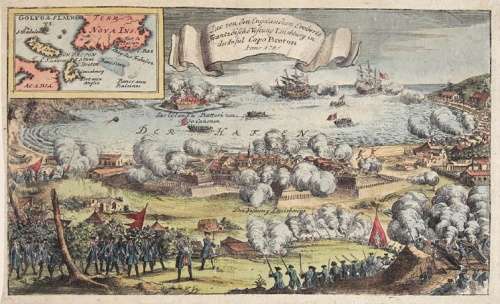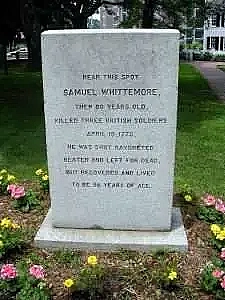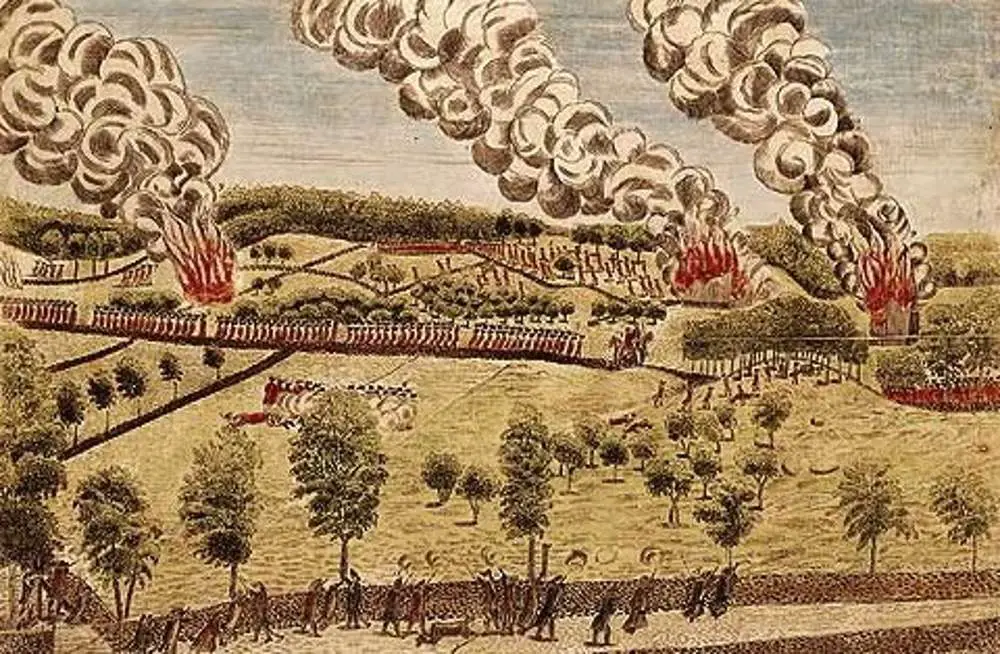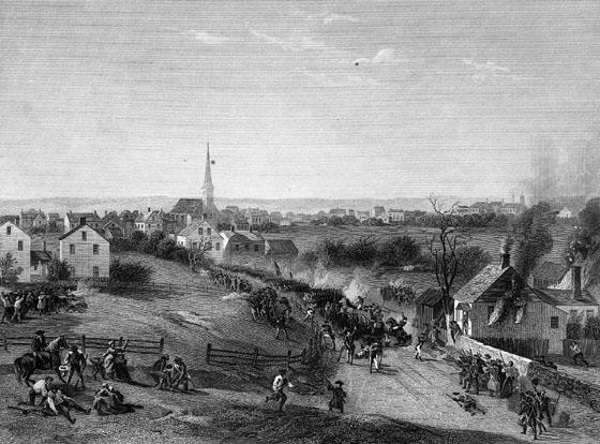On April 19, 1775, British soldiers left Samuel Whittemore in a pool of blood alongside a stone wall in Menotomy, Mass. As they retreated from the Battles of Lexington and Concord, they had shot the old farmer in the face. Then they bayoneted him at least six times and clubbed him, apparently, to death.
When his family found his body, they thought he was dead. But a doctor patched up Samuel Whittemore and the 78-year-old lived.
For another 18 years.
But then it took 230 years for Massachusetts government to acknowledge the old man’s heroism that day.
Samuel Whittemore
Samuel Whittemore was born on July 27, 1696 in Charlestown, Mass., to Samuel Whittemore and Hannah Rix. He had some education, married twice, had a daughter and farmed land in Menotomy, then part of Cambridge, now Arlington.
Whittemore was no spring chicken when he fought the French in Canada. He had reached his mid-40s when he enlisted as a private in Col. Jeremiah Moulton’s Third Massachusetts Regiment. Whittemore participated in the capture of the French fortress at Louisbourg in 1745. During the conflict, he captured an ornate sword from a French officer. The weapon would reappear in the American Revolution.

The capture of Louisbourg, the most celebrated English victory in all the French and Indian wars.
More Fighting?
The story then gets murky about Samuel Whittemore. According to some, he fought in the French and Indian War, again fighting the French in Canada. And in 1763, at the ripe old age of 67, he led troops against Chief Pontiac in the Great Lakes region. During hand-to-hand combat, the legend goes, Samuel Whittemore took a pair of dueling pistols from the opponent he bested. Or perhaps he took them off the body of a dead warrior.
Historians have found little documentation of Samuel Whittemore’s military service after he served in King George’s War. But they have found records of his resistance to the British Parliament, not as a fighter but as a civic leader.
The Town of Cambridge, to which Menotomy belonged, elected him to a committee in 1768, after the repeal of the Stamp Act. The committee instructed the town’s representative to the General Court on how to vote. That same year, Cambridge elected him as a delegate to the Massachusetts Committee of Convention, which objected to Parliament’s revenue acts and the quartering of troops in Boston.
And late in 1772, the people of Cambridge elected 76-year-old Samuel Whittemore to the town’s Committee of Correspondence. The committee stridently objected to the Tea Act and cautioned,
If we cease to assert Our rights we shall dwindle into supineness and the chains of slavery shall be fast rivetted upon us
The British Retreat
 Then came the skirmishes in Lexington and Concord. News traveled fast throughout the countryside, and hundreds of militia men from nearby towns came to harass the British as they retreated to Boston.
Then came the skirmishes in Lexington and Concord. News traveled fast throughout the countryside, and hundreds of militia men from nearby towns came to harass the British as they retreated to Boston.
Samuel Whittemore left his field in Menotomy, gathered his old weapons and positioned himself behind his stonewall.
When the regiment passed by, Samuel Whittemore stood and shot point-blank at a British regular with his musket. Then he took out his dueling pistols and shot two more soldiers to death.
The old farmer then grabbed his ornamental sword to fend off the British soldiers who swarmed over him. It didn’t go so well. The British shot him in the cheek, bayoneted him and beat him with the butts of their rifles.
Samuel Whittemore then fades from the historical record until his death on Feb. 2, 1793, at the age of 96. He was laid to rest in the Old Burying Ground in Arlington.
The Massachusetts Legislature declared him the official state hero in 2005, though the Senate got his age and dates wrong in the proclamation.
The stone marker memorializing him also gets a few things wrong.
Near this spot Samuel Whittemore, then 80 years old, killed three British soldiers, April 19, 1775. He was shot, bayoneted, beaten and left for dead, but recovered and lived to be 98 years of age.
This story was updated in 2023.



1 comment
[…] to describe the family's Thanksgiving meal. She noted that her dour grandmother had argued that the American Revolution was depriving Connecticut citizens of their property. The day, therefore, really should be one of […]
Comments are closed.